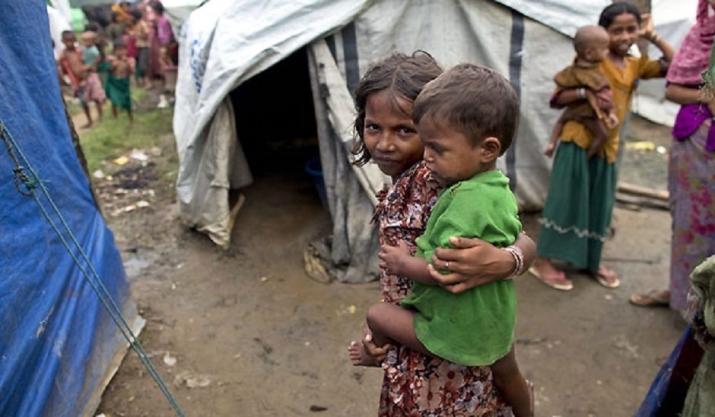NEWS
Buddhist Aid Workers in Myanmar’s Troubled Rakhine State Risking Public Censure
 A Rohingya girl, whose family was displaced by sectarian violence in 2012, carries a baby at Nga Chaung Refugee Camp in Pauktaw, in Myanmar's northern Rakhine State. From asiancorrespondent.com
A Rohingya girl, whose family was displaced by sectarian violence in 2012, carries a baby at Nga Chaung Refugee Camp in Pauktaw, in Myanmar's northern Rakhine State. From asiancorrespondent.comAmid escalating unrest in Myanmar’s strife-torn northern Rakhine State, where the United Nations reports that as many as 30,000 people have been displaced in recent weeks by renewed violence, Buddhist aid workers, employed by aid agencies operating in the region to ease the plight of Myanmar’s beleaguered Rohingya Muslims, are facing the threat of repercussions from their own communities for their work.
Religious tensions between Buddhists and Muslims have simmered in Myanmar for almost half a century, but came to a head with violent clashes in 2012 that killed more than 100 people. Rakhine State is one of the most sensitive and conflict-prone regions in Myanmar, particularly since outbreaks of anti-Muslim violence in 2012 and 2013, following which 140,000 people, most of them Rohingya Muslims, were displaced. Most Rohingya remain in squalid resettlement camps where they are subject to severe restrictions, with limited access to education, healthcare, or employment opportunities.
Security forces in the volatile region have recently launched an aggressive crackdown in response to deadly attacks on 9 October on border guard posts in Maungdaw township, near the border with Bangladesh, in which nine police were killed. Myanmar’s military has reportedly killed dozens of people and arrested scores more in their hunt for the perpetrators, who the government says are Rohingya militants. The action has been accompanied by reports of widespread human rights abuses, however humanitarian workers and journalists have been banned from entering Maungdaw.
Soe Aung (not his real name), a Buddhist Myanmar national who works with an international aid agency helping Rohingya Muslims in his hometown of Sittwe, the capital of Rakhine State, is reluctant to talk about his work at all outside close friends or family for fear of reprisals or being seen as a traitor. “I stay low-profile here. In conversations, in the tea shop, I don’t talk about it and I don’t argue with local people,” he told IRIN, a news agency focusing on humanitarian issues in regions that are often under-reported or ignored by mainstream media. (IRIN)
Many Buddhist communities ihave come to resent the presence of international aid organizations operating in the region due to the perception that the work the agencies are doing is primarily focused on helping the Rohingya, while ignoring the difficulties faced by the ethnic Bamar majority in Myanmar’s second-poorest state.
Gabrielle Aron, director of programs for CDA Collaborative Learning Projects, a non-profit organization that works to improving the effectiveness of humanitarian assistance providers, acknowledged the pressures that local aid workers are facing.
“Given the perception among much of the ethnic Rakhine community that most international agencies primarily support the Muslim population, working for these agencies as an ethnic Rakhine person can be seen as a betrayal, given the intercommunal tensions,” said Aron, who recently authored a report on conflict sensitivity in Rakhine that recognizes the difficult relationship between local aid workers and their communities. “They are in a tough position. Many staff of international agencies are genuinely dedicated to the work that they do, but they have a difficult line to walk.” (IRIN)
Myanmar classifies Rohingya Muslims as stateless foreign migrants even though they have lived in Myanmar for generations. The country’s population also includes Muslims from other ethnic groups. According to the Washington, DC-based Pew Research Center, Buddhists make up about 80 per cent of Myanmar’s population of some 52 million, and Muslims just 4 per cent. The radical nationalist Committee for the Protection of Nationality and Religion (Ma Ba Tha), a collective of hardline Buddhist abbots and influential monks founded in 2013, has previously stoked religious division by asserting that Myanmar’s Buddhist population and culture is under threat from Islam. More recently, major figures from Myanmar’s mainstream political and religious communities have publically spoken out against Ma Ba Tha, saying the group’s policies are not representative of the country’s Buddhist sangha, which has some 250,000 members according to a government estimate, and do not reflect the essence of Buddhism.
See more
Buddhist aid workers face backlash for helping Myanmar's Rohingya Muslims (IRIN)
30,000 displaced by violence in northern Rakhine State: UN (The Myanmar Times)
Related
Buddhist Hardliners Protest Annan’s Visit to Myanmar’s Troubled Rakhine State (Buddhistdoor Global)
Myanmar Picks Former UN Chief Kofi Annan to Head Buddhist-Muslim Rakhine Commission (Buddhistdoor Global)
Myanmar to Form Buddhist-Muslim Commission to Address Humanitarian Crisis in Rakhine State
(Buddhistdoor Global)
Top Buddhist Authority in Myanmar Begins Moving Against Extremist Buddhist Organizations (Buddhistdoor Global)
Aung San Suu Kyi to Lead Peace Effort in Rakhine Against Backdrop of Political Complications (Buddhistdoor Global)
Lone Buddhist Reaches Out to Rohingya Children in Myanmar (Buddhistdoor Global)
Aung San Suu Kyi Urges Tolerance and Unity in Myanmar’s Troubled Rakhine State (Buddhistdoor Global)














